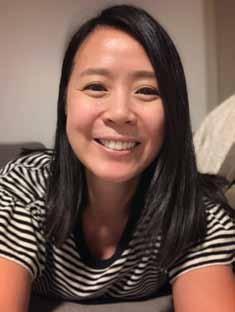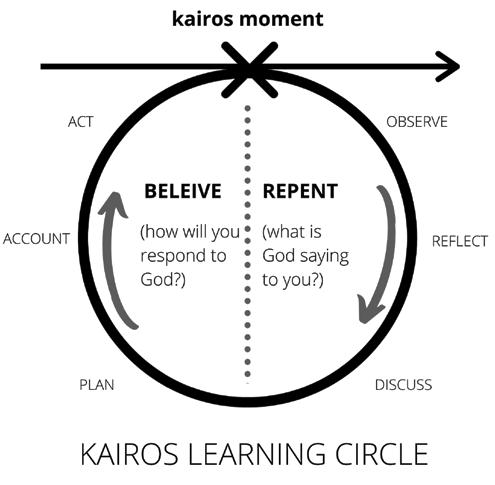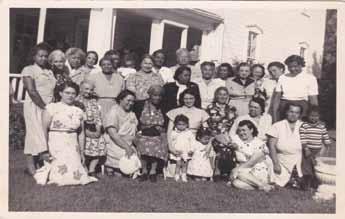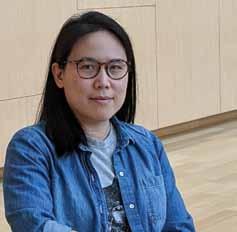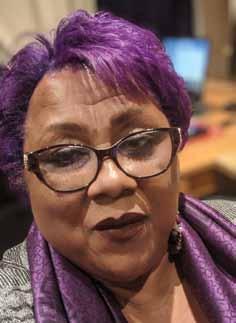
9 minute read
Awkward Place
On being White and married to a Black man
by Evie Klein Whittingham
Advertisement
Evie worships at First Baptist Church Ingersoll where her husband pastors The Whittingham family I am a middle -aged White woman married over 30 years to a Black man who pastors a Canadian Baptist congregation in a rural Ontario town. We have three adult children living and working in Toronto. I imagine that more often than others, I am in this awkward place of being conscious of being White, conscious of having my relationships with my husband and children under scrutiny, and conscious of the subtle and insidious ways family, friends, others, and I are biased, unknowingly or not, against one another.
When Trevor and I started dating I was prepared for the double-take when we went out. But I was perplexed when we announced our engagement and a good friend said it was great, because, ‘He isn’t that Black.’ He was an exception—implying that others who were Jamaican or Black, didn’t fit in or measure up.
This made me question my own motives. I loved Trevor because he valued my intelligence, wasn’t intimidated by my strengths and encouraged my character
Ways to Speak Listen and Speak
Go to God for emotional strength. Ask Him to equip you with supernatural grace, lucid thinking and wisdom. Go to Him for whatever you need.
Consider what White privilege looks like, sounds like and feels like for your non-White neighbour.
Listen to Black people, even if they are angry. Hear people out with openness and grace. Grieve with them over their loss and pain without making it about you.
Don’t judge. Don’t be defensive. Examine your own heart. I’m sure you haven’t deliberately insulted someone, but maybe you find Black people hard to get along with because they can seem so intense about their identity.
Be brave. Call out injustice and unfairness. Mediate. Is the conflict at work only a personality difference? Or is it misunderstanding and impatience with others who have a different language, culture, style, appearance or approach?
Resist the urge to make scapegoats of people who are not your own. Jesus is our scapegoat. His death absolves all people who seek Him. And even those who apparently reject Him are made in His image and have an unfinished journey that will take them to the cross. development. Would I have considered him as a life partner if he hadn’t assimilated so well into Canadian culture, losing his accent, wearing White dude clothes (except for plaids), putting himself through college, and adopting the social norms of our mostly White peers?
Returning home from our honeymoon in Jamaica, I experienced what many Black women as partners of Black men have to endure—extra attention by a Canada Customs agent who conducted a “random” search of my luggage . . . suspicious that Trevor or I had hidden contraband in my luggage. It was unnerving and humiliating to have my handworked souvenirs cut and ruined. Trevor was unfazed: “Just be cool.”
For decades in our church, people of colour had never been in upfront leadership. The Lord redeemed that situation through our pastor and others who were antiracist in their actions, finally calling Trevor to become the church’s first Black deacon. That didn’t surprise me. Good men and women, Black and White, had mentored Trevor. They had loved him as a son and brother. But I knew . . . those who broke the ground before him had endured much.
Secretly, I prayed for our children to be born beautiful. Would they face adversity for who they were? I took care to keep them presentable and attractive wherever
we went and equipped them in the social graces. “Is she your daughter? Isn’t she gorgeous? I just love her halo of curls,” I heard as my children grew up. I was flattered and proud but something niggled.
As my children grew older, people consistently made uninvited pronouncements on whether they were Black or White, Jamaican or German, opining on their differences, on their identity. But my children never understood why they would have to choose. To this day they don’t.
These are superficial acts, but they underscore how impactful other people’s perceptions and reactions are. These acts all affected how I interacted with teachers, doctors and any professionals. We had social, educational and financial advantages but it was draining to keep on advocating for our children at school and elsewhere with so many bureaucratic and systemic barriers. I learned that so much more is at stake for a child who is noticed by strangers and friends for their skin colour, hair and any signs of non-conformity.
Black-on-Black and White-on-Black violence isn’t theoretical for us. Our friends and family have been directly impacted by this reality. We live with the real possibility that someone in our extended family can be harmed, whether innocent or due to poor choices, any time, any day. I live with an underlying anxiety that even my son, who wears his hair clipped short and dresses like the business professional he is, could be stopped for a traffic violation and face harassment and worse for driving while Black.
“Cast all your cares on Him,” comforts me greatly, but I want more power to deliver hope and healing. I want that awkward place I live in to disappear because it’s been filled with righteous words and just actions. It’s been filled with peace. It’s become a place where I know my children, my husband and I have finally been seen. And heard.
live simply give generously

CONTEST - PRIZES!
Become a monthly donor to Baptist Women and invite your groups and friends to become monthly donors as well.
You’ll receive a thank you gift.
But that’s not all! We’ve lined up some great goodies and grand prizes for the individual and group who sign up the most monthly donors by December 25!
Don’t miss out. Find out how our monthly donors impact lives at baptistwomen.com/causes/impact-stories
How to Be an Anti -Racist Foodie
Come to the table
When I was in high school , my parents left their well-paying day jobs and returned to school full-time. We moved across country to unfamiliar terrain: Atlanta, Georgia. Our new home in graduate student housing was a red brick building surrounded by claybaking heat.
The neighbours above us were a young couple with a baby. They were not friendly. Almost immediately, they commented that our food smelled like garbage. To them, the fumes were noxious enough to make their eyes water and forcibly induce coughing. No one had ever complained about smells between apartments before. But the couple insisted; the ventilation pipes were bringing foul food odours from our apartment into theirs.
by Lis Cristina Lam
Lis is the creator of The Subversive Table, a food blog.
We were embarrassed but my parents accommodated: they used air freshener, cooked more Western food; cooked less strongsmelling food; opened windows and doors (to let the smells out), and so on. But it wasn’t good enough. They kept complaining, no matter what we did.
After a tension-filled year, they moved out. When a new family arrived, we braced ourselves for similar complaints. Only they never materialized. Instead, the smells “magically” disappeared.
After that, we understood. Our neighbours’ complaints had not been about our food—they had been about us. They didn’t call us Chinks or Gooks but you could tell that’s how they felt. When we passed each other on the sidewalk, they rarely acknowledged our presence. While they were chatty and amiable with everyone else, they gave us curt nods and stiff-lipped grimaces. Their interactions communicated that they didn’t want to live near us, associate with us, or get to know us.
Ibram X. Kendi, in his seminal book, How to be an Antiracist, defines racism as a powerful system fuelled by faulty ideas of human value. Viewing one racial group as superior or inferior to another is racist. Enforcing and participating in policies that support such ideas are racist, too.
Were our neighbours racist? Some might say yes, others no. On the one hand, their racism was not explicit. They didn’t vandalize our property with racist graffiti or tell us to “go back home” to Korea. On the other hand, they communicated a strong disdain and contempt toward us and our food. Their food was normal, our food was weird. They were educated and knew better, we were ignorant immigrants. They didn’t need correcting, but we certainly did. Our neighbours were incensed by our very presence and we lived a miserable year under their constant scrutiny and criticism.
Our food smelled like garbage
Racism shows up as implicit bias, shortened life expectancies, higher infant mortality rates, wealth disparities, limited job opportunities, harsher judging sentences, mass incarceration, and more. And yes, racism also appears as neighbourly complaints about offensive food smells. It’s become invisible and normalized.
Like many others, I have been inspired by the Black Lives Matter movement to examine my own racial bias. And I’ve come to understand that no one is completely free from prejudice. We’ve all adopted assumptions rooted in racist ideas.
So where do we go from here? How do we, as the people of God, respond?
As a food blogger and person who loves to cook and host, I believe this all begins at the table.
Jesus invited everyone to the table. Amazingly, His table upended all notions of social and religious hierarchy. The head of the table was now called to be the servant. The greatest among those seated now called to be the least. Jesus encouraged people to see themselves and others as equals. When people used the table as a means to dominate and control, Jesus exposed their false notions of human value and challenged their hypocrisy.
In the early church, people celebrated table fellowship across socio-economic and racial lines. Jew and Gentile, male and female, slave or free—all were one at the table of Christ. No one could boast membership based on ancestral lineage, righteous works, status or wealth. All were invited. All were welcome.
Today, we need to examine our own tables. There are people who are conspicuously absent. We, too, carry ideas about who belongs at our tables and who doesn’t. Who are they? Why are they missing? Instead of saying, “But I’m not racist,” we must be willing to consider: How do our hidden assumptions and biases move us closer to certain individuals and further away from others? Why do we feel safer with some but not with all?
As we move closer to Jesus, we become more like Him. We begin to see our hidden racism and desire real change. The walls come down and our tables expand. We let go of our need to control and allow Jesus to be the host. Our tables become transformed places. And we become a transformed people. Lis Cristina Lam
